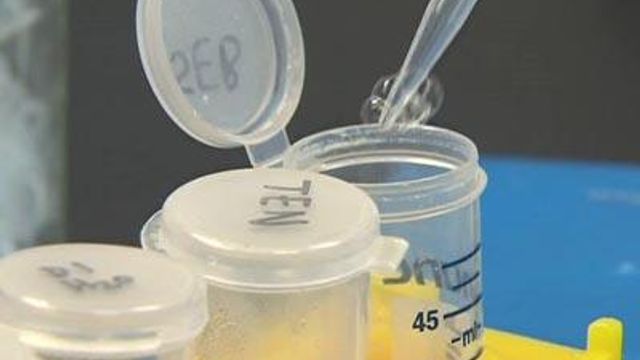Proposed DNA law could lead to thousands of arrests
Last year, 27 House legislators sponsored House Bill 1403, which would allow law enforcement officers to collect a DNA sample from any person arrested on a felony charge.
Posted — UpdatedThe bill, however, was never ratified, and as the state lawmakers reconvene for the 2010 legislative session, they are being asked to try again.
On Tuesday, Gov. Bev Perdue, who allocated $700,000 in her 2010-11 budget for that purpose, called on state lawmakers to pass the legislation, which the State Bureau of Investigation estimates could mean solving up to 100 cases within a year.
"We want to expand our DNA database," said North Carolina Attorney General Roy Cooper told NC Wanted.
Cooper has long pushed for and succeeded in expanding the SBI crime lab's DNA testing capabilities. "We believe, if we get more samples in the database earlier, then we can solve crimes more quickly," he added.
The bill's supporters say such a DNA arrest law would help stop repeat offenders. Statistics show that those who commit felonies are likely to have committed other crimes.
"If we receive the (DNA) sample upon arrest, versus the person having to be convicted, which could take years, we will then test the sample more quickly, upload it to our database more quickly and potentially get a hit more quickly," said Amanda Overman, state administrator for the FBI's Combined DNA Index System, also known as CODIS.
One example of where such a law could have proved beneficial is with the arrest of Jason Williford, a Raleigh man charged with first-degree murder, rape and burglary in the high-profile homicide of state Board of Education member Kathy Taft.
Taft, 62, was beaten and sexually assaulted in a Raleigh home in March while recovering from surgery. She died three days later from her injuries.
Raleigh police investigators became suspicious of Williford after he refused to provide a DNA sample. Sources say investigators eventually linked him to the Taft case through a discarded cigarette butt.
Much of the costly multi-week investigation – police asked all residents in the neighborhood where Taft was assaulted for DNA samples – could have been avoided if the DNA arrest law were in place when Williford was arrested for felony first-degree burglary in the early part of the decade.
His DNA would have been stored in the SBI's DNA database, and investigators would have been able to link him to the case sooner.
"I hope the General Assembly will see the wisdom in doing this," Cooper said.
In 2001, the state's DNA database had 18,000 samples. Since a 2003 law went into effect requiring anyone convicted of a felony to submit a DNA sample, the number has climbed to more than 180,000.
Last year, Overman said, there were approximately 150,000 felony arrests. At 150,000 new samples per year, it would take only a decade for today's 180,000 samples to skyrocket to nearly 2 million.
But some people have concerns about the proposed law, how DNA samples would be used and how testing and programs under the law would be funded.
"If you're going to put all this information in a database, who's going to do it?" asked local defense attorney Hart Miles.
Miles represents Jeffrey MacDonald, a former Fort Bragg soldier and Army doctor appealing his conviction for the 1970 slayings of his wife and two daughters.
Sixty-six-year-old MacDonald, who is serving three life prison terms, is seeking a new trial based partly on DNA evidence. The DNA test results involve hair found under his daughter's fingernail that did not match MacDonald or anyone in his family.
"Where's the funding going to come from? And is it going to create such a backlog of work that it's going to cause delays in the cases going on right now?" Miles asked.
Supporters of a DNA arrest law admit a surge in samples would be costly, from expensive new equipment to more trained analysts and lab technicians.
Miles worries a growing government-run DNA database could be tempting for genetic research and purposes other than identification.
"How's it going to be used? Who's going to have access to it? And how long are they going to keep it?" he asked.
DNA is also being used more and more to clear people convicted of crimes they didn't commit.
One of the most notable cases in recent years is the case of Dwayne Allen Dail, who was released in August 2007 after spending 18 years in prison for the 1987 rape of a 12-year-old Goldsboro girl.
She initially identified Dail as her attacker, and hair found at the scene was similar to his. DNA evidence found on a fragment of the girl's nightgown years after the trial, however, proved Dail wasn't involved in the attack.
William Jackson Neal Jr. was convicted of the crime last month and sentenced to life in prison.
Some state laws, such as California, require DNA samples from every person arrested, regardless if it is a felony. North Carolina had more than 650,000 arrests last year, so the current proposed law, limited to felony arrests, seems more manageable.
• Credits
Copyright 2024 by Capitol Broadcasting Company. All rights reserved. This material may not be published, broadcast, rewritten or redistributed.





